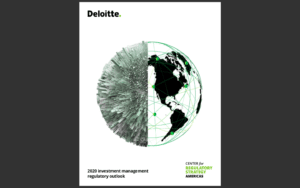
Deloitte highlighted that asset managers this year will face more regulatory scrutiny of their holdings of higher risk assets, implementation of technological change and should continue to modernize their regulatory, legal, and compliance functions.
The consultancy’s 2020 Investment Management Regulatory Outlook said: “Although the post-crisis wave of regulatory change is subsiding, there is much to attract regulatory and supervisory attention in 2020, and firms should not expect scrutiny to abate.”
As a result, Deloitte added that investment managers should continue to modernize and rationalize their regulatory, legal, and compliance functions and their practices.
“Investment management companies that take a holistic view of regulatory risk management may find efficiencies that lead to streamlined and rationalized programs,” said the study. “Some companies are even looking at their regulatory and compliance risk management programs as a competitive differentiator that allows them to be more nimble in the market place.”
In order to correctly identify risks asset managers should use analytics to review ever-increasing volume of data now being collected.
The report continued that asset managers likely find it hard to perform well in the current environment with high asset prices and low growth potential. As a result, active managers are likely to make more investment in exotic and less liquid markets to boost their returns.
“We expect supervisors to focus increasingly on how investment managers and distributors satisfy themselves that funds holding higher risk assets meet the needs and risk appetite of their target market,” added Deloitte.
Cybersecurity
Regulators are also concerned about ineffective implementation of technological change as there is growing evidence that it can increase cyber and operational risk.
“International standard-setters will likely try to establish baseline common approaches for operational resilience, but we expect progress on cyber-resilience to be made mostly at the G7 and European levels,” said Deloitte.
Cybersecurity issues also continue to grow. Deloitte said that its recent industry survey, in collaboration with FS-ISAC, found that financial services institutions spend 10.1% of their IT budget on average on cybersecurity. However, the number of data breaches in the first six months of last year increased by 54% over the same period in 2018.
Brexit
Brown Brothers Harriman noted in its On the Regs blog that the UK is due to leave the European Union at the end of this month. “Most asset managers have had contingency plans in place for several months now and have notified regulators of their plans,” added the blog.
Sean Tuffy, head of regulatory intelligence, custody & fund services at Citi, said in a report last month that there is an outstanding financial regulation issue related to Brexit that has not garnered much attention
The What Does it Mean for FinReg? report explained that a new Financial Services Bill was meant to codify EU laws into the UK statute book but was delayed due to the election, so a new version of the bill needs to be passed before 31 January.
Tuffy said that if a new bill is not passed and there is a no-deal Brexit, then the UK will not have equivalent rules and likely lose even limited access to the EU.
“It also would raise practical issues around cross-border regulatory reporting, such as derivatives transaction reporting,” he added. “So far both sides have shown a great willingness to avoid a hard Brexit but, the industry would sleep better knowing that a contingency plan is in place.”
BBH also noted that that the UK’s Senior Managers and Certification Regime took effect for asset managers on December 9 last year. The regime holds firm leaders to a high professional standard, increases accountability on individuals and has extraterritorial applicability.
In addition, the BBH blog highlighted that the fifth EU anti-money laundering directive takes full effect this week as member states were given until January 10 to put enabling legislation in place and beneficial owners will have to register in each country’s registry.







